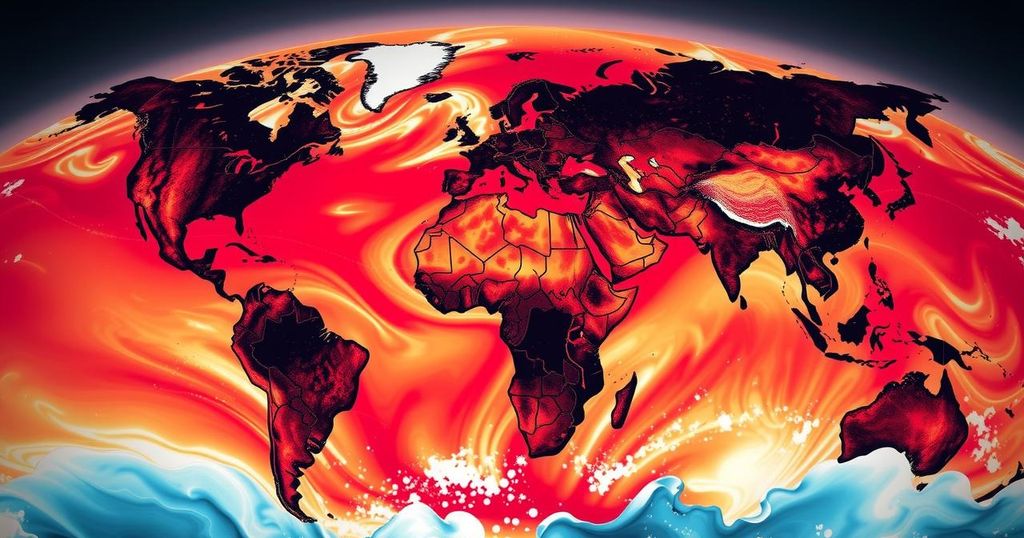The year 2024 marked the first occurrence of global average temperatures exceeding 1.5°C above pre-industrial levels, as confirmed by the Copernicus Climate Change Service. This year showcased extreme weather events, including devastating floods, prolonged droughts, and severe heat waves, particularly affecting vulnerable regions. Natural factors such as a strong El Niño contributed to these temperature rises, highlighting the interactive effects of human-induced global warming and natural climate phenomena. The results serve as critical indicators demanding immediate action against climate change, with future years at risk of similar extremes.
The year 2024 marked a significant turning point in global climate history, according to a report from the EU’s Copernicus Climate Change Service. It confirmed that the global average temperature exceeded 1.5°C above pre-industrial levels for the first time ever, with 11 months registering above this critical threshold. This unprecedented rise in temperature was evident across nearly all continents, except Australasia and Antarctica, rendering 2024 the hottest year on record, following the previous record holder, 2023.
The extreme weather phenomena of 2024 included severe flooding in Pakistan and Afghanistan, a prolonged drought impacting the Amazon River, and oppressive heat waves in Athens, Greece, prompting the closure of the ancient Acropolis to safeguard tourists. These climatic changes have raised concerns about the sustainability of ecosystems and human health, particularly in low-income nations vulnerable to extreme heat and increased rainfall.
Through advanced reanalysis methods, Copernicus utilized extensive data from satellites and other observational tools to illustrate the temperature fluctuations and attribute specific extreme weather events to climate change. Importantly, while surpassing 1.5°C in a single year signals a worrying trend, it does not equate to the long-term average exceeding the Paris Agreement threshold, which currently stands at approximately 1.3°C.
Natural climate phenomena, particularly a robust El Niño, have exacerbated the warming trend in 2024, stressing the significant impact of both human-induced climate change and natural variability. As the scientific community cautions, even marginal increases in global temperatures can lead to severe consequences, including the irreversible melting of polar ice and more frequent catastrophic weather events.
The report emphasizes that, in 2024, 44% of the globe faced significant heat stress, with atmospheric moisture levels also rising by 5% compared to recent averages. This increase in moisture contributes to the intensification of extreme rainfall, as evidenced by severe flooding in regions such as Valencia, Spain. Looking forward, it is imperative to reduce greenhouse gas emissions urgently and adapt societal structures to withstand these unparalleled climatic challenges.
As the climate crisis continues to escalate, the record temperatures of 2024 serve as a clear indication of the profound impact of human activities on Earth’s climate system. Stakeholders and policymakers must heed this wake-up call and commit to effective climate action and sustainable development strategies to mitigate future risks and preserve ecological integrity.
The Copernicus Climate Change Service provides crucial insights into global temperature trends and climate-related phenomena. The 2015 Paris Agreement established a target of limiting global warming to 1.5°C above pre-industrial levels to avoid the most severe ramifications of climate change. The rising average temperatures are indicative of ongoing human influence on the climate, compounded by natural climate variations, notably El Niño experiences, which further complicate the global climate’s response.
The new record for global temperatures in 2024 underscores the urgency of addressing climate change. With nearly half the globe experiencing significant heat stress, immediate action to reduce greenhouse gas emissions and adapt our infrastructure is imperative to safeguard human health and the environment. The scientific community’s findings highlight that even slight temperature increases may have far-reaching consequences, emphasizing the need for sustained commitment to climate mitigation efforts.
Original Source: theconversation.com






